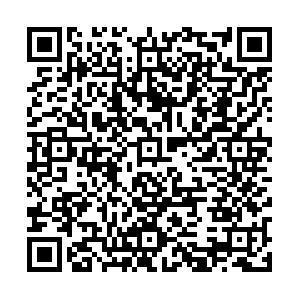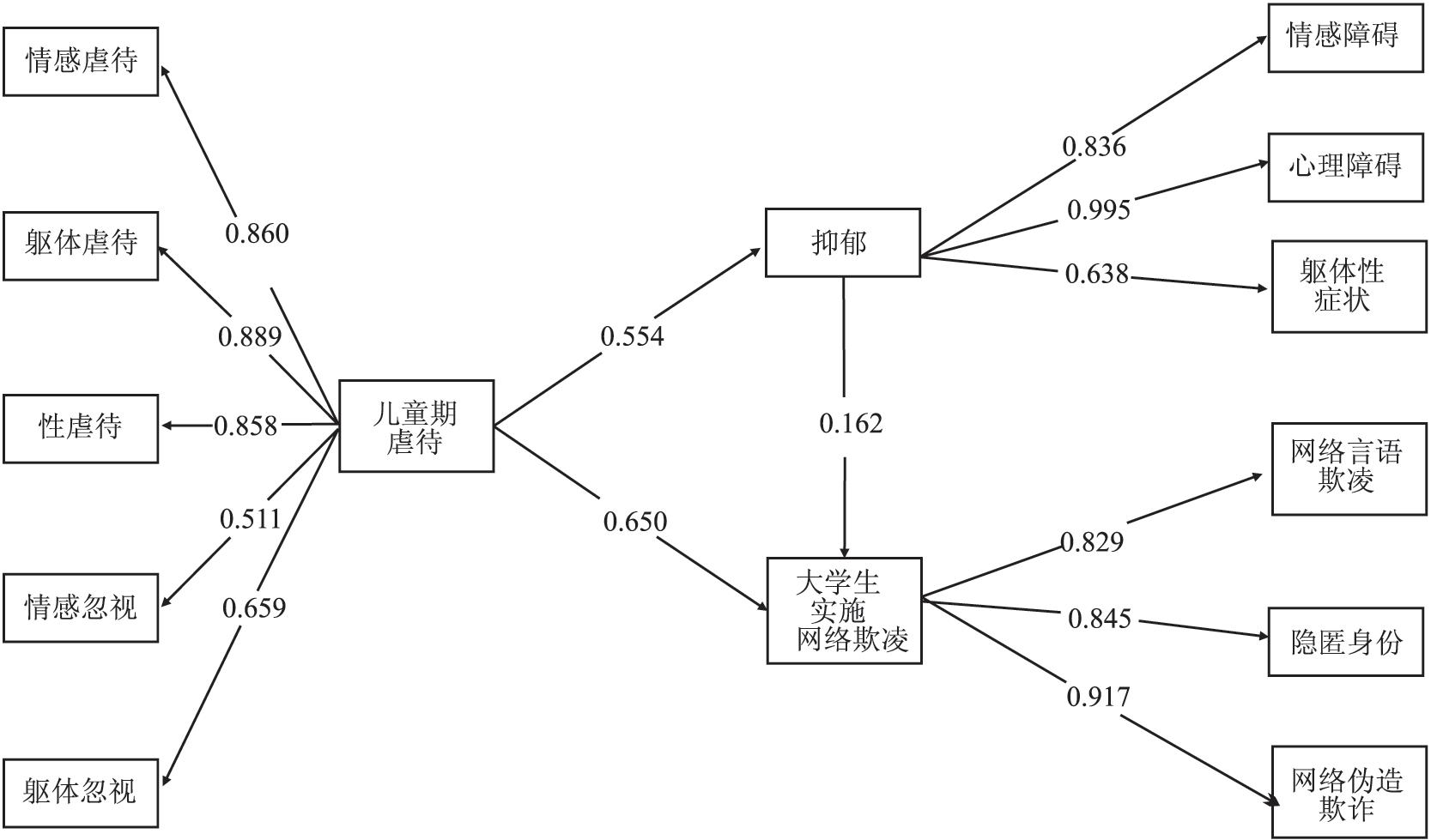The mediating role of depression symptoms in childhood abuse and cyberbullying among college students
-
摘要:
目的 分析抑郁在儿童期虐待与实施网络欺凌间的关系, 为探讨大学生网络欺凌行为、防范大学生实施网络欺凌提供依据。 方法 采用网络欺凌量表、儿童期虐待量表和抑郁自评量表对山西省6所高校的4 040名大二和大三学生进行问卷调查。 结果 在实施网络欺凌及网络言语欺凌、隐匿身份和网络伪造欺诈三个维度上, 男生和独生子女学生得分均高于女生和非独生子女学生, 差异均有统计学意义(均有P < 0.001)。儿童期虐待经历、成年期抑郁症状与大学生实施网络欺凌行为各维度两两间均成正相关(均有P < 0.001)。中介效应结果显示, 成年期抑郁症状在儿童期虐待经历与实施网络欺凌行为之间为中介作用(中介效应为0.090, P < 0.001), 中介效应对总效应的贡献率为12.16%, 中介模型拟合指数为χ2/df=39.96, RMSEA=0.101, CFI=0.948, TLI=0.924, SRMR=0.043。 结论 儿童期遭受虐待经历、成年期抑郁症状与大学期间实施网络欺凌行为关系密切, 且抑郁症状在儿童期遭受虐待经历预测大学生实施网络欺凌行为的路径中起部分中介作用。 Abstract:Objective Analyze the correlation of depression between the childhood abuse behavior and adulthood cyberbullying behavior, so as to discuss and provide evidences for preventing the cyberbullying behavior of college students. Methods A total of 4 040 college students were surveyed after multistage stratified cluster random sampling from 6 universities in Shanxi Province of China by using childhood trauma questionnaire, self-rating depression scale and cyberbullying scale. Results In the three dimensions of cyberbullying, cyber-verbal bullying behavior, identity concealing behavior and cyber-forgery fraud behavior, male students and only child students scored higher than that of female students and non-only child students(all P < 0.001). There was a positive correlation between childhood abuse, adult depression and cyberbullying(allP < 0.001). The mediation effect results showed that depression symptoms of college students were mediating between childhood abuse experience and cyberbullying behavior(the mediation effect result was 0.090, P < 0.001), the mediation effect contributed 12.16% to the total effect, the mediation model fitting index were χ2/df=39.96, RMSEA=0.101, CFI=0.948, TLI=0.924, SRMR=0.043. Conclusions Childhood abuse experience and adulthood depression are closely related to the implementation of cyberbullying behavior in college, and depression plays part of mediating role in predicting the implementation of cyberbullying behavior in college students who has childhood abuse experience. -
Key words:
- Childhood abuse /
- Cyberbullying /
- Depression /
- Mediation effect
-
表 1 大学生实施网络欺凌行为及各维度在人口学变量上的差异
Table 1. The differences in demographic variables from cyberbullying and the sub-scales scores of cyber verbal bullying, hidden identity and cyber counterfeiting fraud among college students
组别 人数(人) 实施网络欺凌行为评分 网络言语欺凌 隐匿身份 网络伪造欺诈 网络欺凌总分 性别 男 1 956 7.11±3.08 2.85±1.38 6.58±3.07 16.54±6.93 女 2 019 6.30±2.57 2.63±1.20 6.07±2.63 15.00±5.86 t值 9.018 5.312 5.645 7.573 P值 < 0.001 < 0.001 < 0.001 < 0.001 年级 大二 2 361 6.73±2.84 2.77±1.32 6.43±2.98 15.92±6.56 大三 1 614 6.65±2.90 2.70±1.26 6.17±2.69 15.52±6.29 t值 0.815 1.543 2.870 1.937 P值 0.415 0.123 0.004 0.053 是否独生子女 是 1 301 6.89±3.14 2.86±1.45 6.66±3.27 16.41±7.22 否 2 674 6.60±2.72 2.68±1.21 6.16±2.64 15.45±6.02 t值 -2.794 -3.775 -4.845 -4.159 P值 0.005 < 0.001 < 0.001 < 0.001 生源地 城市 1 006 7.07±3.27a 2.89±1.49a 6.84±3.39a 16.80±7.50a 城镇 933 6.74±2.86 2.80±1.31b 6.51±2.99b 16.06±6.56b 农村 2 036 6.49±2.62a 2.64±1.17a, b 5.98±2.45a, b 15.11±5.73a, b W值 12.511 13.001 31.284 22.603 P值 < 0.001 < 0.001 < 0.001 < 0.001 注:a, b标有相同字母的分组之间差异有统计学差异。 表 2 儿童期遭受虐待经历、抑郁和大学生实施网络欺凌行为及各维度的相关系数
Table 2. Correlation coefficients of childhood abuse, depression and cyberbullying among college students
维度 情感障碍 心理障碍 躯体性症状 躯体虐待 情感虐待 性虐待 躯体忽视 情感忽视 虐待总分 网络言语欺凌 隐匿身份 网络伪造欺诈 实施网络欺凌行为 情感障碍 1.000 心理障碍 0.803 1.000 躯体性症状 0.522 0.617 1.000 躯体虐待 0.390 0.439 0.348 1.000 情感虐待 0.463 0.502 0.379 0.765 1.000 性虐待 0.379 0.428 0.347 0.778 0.742 1.000 躯体忽视 0.330 0.380 0.291 0.565 0.557 0.525 1.000 情感忽视 0.177 0.206 0.162 0.449 0.402 0.396 0.638 1.000 虐待总分 0.402 0.453 0.354 0.832 0.804 0.799 0.823 0.789 1.000 网络言语欺凌 0.385 0.417 0.304 0.500 0.521 0.508 0.416 0.281 0.523 1.000 隐匿身份 0.396 0.431 0.323 0.516 0.510 0.509 0.408 0.270 0.518 0.729 1.000 网络伪造欺诈 0.395 0.444 0.343 0.637 0.588 0.622 0.480 0.352 0.631 0.756 0.774 1.000 实施网络欺凌行为 0.426 0.469 0.352 0.609 0.595 0.604 0.480 0.336 0.617 0.926 0.868 0.935 1.000 -
[1] 朱鹤, 石凡超, 安澜, 等.中国部分大学生网络欺凌行为发生现状调查分析[J].吉林大学学报(医学版), 2016, 42(3): 605-611. DOI: 10.13481/j.1671-587x.20160337.Zhu H, Shi FC, An L, et al. Investigation and analysis on the current situation of cyberbullying among some college students in China[J]. Journal of Jilin university(medical edition), 2016, 42(3): 605-611. DOI: 10.13481/j.1671-587x.20160337. [2] 赵甜静, 魏婕, 苏倩倩, 等.大学生网络欺凌现状及应对方式分析[J].中国校医, 2018, 32(9): 658-661.Zhao TJ, Wei J, Su QQ, et al. Analysis on the current situation and coping style of college students' cyber-bullying[J]. Chin J School Doctor, 2018, 32(9): 658-661. [3] Hong JS, Lee J, Espelage DL, et al. Understanding the correlates of face-to-face and cyberbullying victimization among U. S. adolescents: a social-ecological analysis[J]. Violence Vict, 2016, 31(4): 638-663. DOI: 10.1891/0886-6708.VV-D-15-00014. [4] Serbin LK. The inter-generational transfer of psycho-social risk: processes of vulnerability and resilience[J]. Annual Review of Psychology, 2004, 55: 333-363. doi: 10.1146/annurev.psych.54.101601.145228 [5] 韩美玲, 高志勇, 曲海英.儿童期心理虐待、自尊状态对烟台市某医学院学生攻击行为的影响[J].医学与社会, 2018, 31(8): 74-77. DOI: 10.13723/j.yxysh.2018.08.025.Han ML, Gao ZY, Qu HY. The influence of childhood psychological maltreatment and self-esteem on aggression behavior of medical students in yantai city[J]. Medicine and Society, 2018, 31(8): 74-77. DOI: 10.13723/j.yxysh.2018.08.025. [6] 孙丽君, 衡书鹏, 牛更枫, 等.儿童期心理虐待对青少年攻击行为的影响:安全感与孤独感的中介效应[J].中国临床心理学杂志, 2017, 25(5): 902-906. DOI: 10.16128/j.cnki.1005-3611.2017.05.024.Sun LJ, Heng SP, Niu GF, et al. Effects of childhood psychological abuse on adolescent aggression: mediating effects of sense of security and loneliness[J]. Chinese Journal of Clinical Psychology, 2017, 25(5): 902-906. DOI: 10.16128/j.cnki.1005-3611.2017.05.024. [7] 张珊珊, 张野, 苑波.初中生抑郁在心理忽视与校园欺凌间的作用[J].中国学校卫生, 2018, 39(10): 1512-1515.Zhang SS, Zhang Y, Yuan B. The role of depression in psychological neglect and bullying in junior middle school students[J]. Chin J Sch Health, 2018, 39(10): 1512-1515. [8] 尤阳.受网络欺凌行为问卷的修订及其影响因素的分析[D].浙江: 浙江师范大学, 2013.You Y. Revision of the questionnaire on cyberbullying behavior and analysis of its influencing factors[D]. Zhejiang: Zhejiang Normal University, 2013. [9] 赵幸福, 张亚林, 李龙飞, 等.中文版儿童期虐待问卷的信度和效度[J].中国临床康复, 2005, 9(20): 105-107.Zhao XF, Zhang YL, Li LF, et al. Reliability and validity of Chinese version of childhood abuse questionnaire[J]. Chinese Journal of Clinical Rehabilitation, 2005, 9(20): 105-107. [10] 张丹霞, 罗家洪, 彭林珍, 等.大学生抑郁自评量表(SDS)调查结果因子分析[J].昆明医科大学学报, 2012, 33(5): 61-63.Zhang DX, Luo JH, Peng LZ, et al. Factor analysis of college students' depression self-rating scale(SDS)survey results[J]. Journal of Kunming Medical University, 2012, 33(5): 61-63. [11] 朱丽娜, 张增国, 郑德伟, 等.大学生焦虑与功能失调性态度在应激生活事件与攻击性间的中介和调节作用[J].中国学校卫生, 2017, 38(8): 1187-1190. DOI: 10.16835/j.cnki.1000-9817.2017.08.020.Zhu LN, Zhang ZG, Zheng DW, et al. Mediating and regulating effects of anxiety and dysfunctional attitude on stress life events and aggression in college students[J]. Chin J School Health, 2017, 38(8): 1187-1190. DOI: 10.16835/j.cnki.1000-9817.2017.08.020. [12] 高杨.大学生人际压力与网络欺凌的关系: 社会兴趣的调节及自卑感中介效应[D].沈阳: 沈阳师范大学, 2018.Gao Y. Relationship between interpersonal pressure and cyberbullying in college students: mediating effect of social interest and inferiority complex[D]. Shenyang: Shenyang Normal University, 2018. [13] 易晓明, 曹宇.初中生智能手机成瘾与人格关系[J].内江师范学院学报, 2017, 32(12): 7-11. DOI: 10.13603/j.cnki.51-1621/z.2017.12.002.Yi XM, Cao Y. The relationship between smartphone addiction and personality in junior middle school students[J]. Journal Neijiang Normal University, 2017, 32(12): 7-11. DOI: 10.13603/j.cnki.51-1621/z.2017.12.002. [14] Rémond JJ, Kern L, Romo L. A cyberbullying study: analysis of cyberbullying, comorbidities and coping mechanisms[J]. Encephale, 2015, 41(4): 287-294. DOI: 10.1016/j.encep.2014.08.003. [15] Fahy AE, Stansfeld SA, Smuk M, et al. Longitudinal associations between cyberbullying involvement and adolescent mental health[J]. J Adolesc Health, 2016, 59(5): 502-509. DOI: 10.1016/j.jadohealth.2016.06.006. [16] 姜永志, 张海钟, 李娜.青少年情绪状态与社会支持对攻击性的预测[J].辽宁师范大学学报(社会科学版), 2011, 34(6): 44-48.Jiang YZ, Zhang HZ, Li N. Adolescents' emotional state and social support predictions of aggression[J]. Journal of Liaoning Normal University(Social Science Edition), 2011, 34(6): 44-48. [17] Campbell MA, Slee TS, Barbara S, et al. Do cyberbullies suffer too?Cyberbullies perceptions of harm they cause to others and to their own mental health[J]. School Psychology Int, 2013, 34(6): 613-629. DOI: 10.1177/0143034313479698. [18] Gibb BE. Childhood maltreatment and negative cognitive styles: a quantitative and qualitative review[J]. Clin Psychol Rev, 2002, 22(2): 223-246. doi: 10.1016/S0272-7358(01)00088-5 [19] Fletcher A, Fitzgerald-Yau N, Jones R, et al. Brief report: cyberbullying perpetration and its associations with socio-demographics, aggressive behaviour at school, and mental health outcomes[J]. J Adolesc, 2014, 37(8): 1393-1398. DOI: 10.1016/j.adolescence.2014.10.005. -





 下载:
下载:

